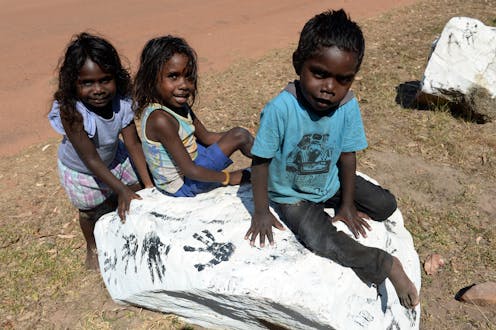A Voice to Parliament will not give 'special treatment' to Aboriginal and Torres Strait Islander Australians. Here's why
- Written by AJ Wood, Professor of law, Australian National University

We asked our readers what they would like to know about the proposed Indigenous Voice to Parliament. In the lead-up to the referendum, our expert authors will answer those questions. You can read the other questions and answers here[1].
Since Prime Minister Anthony Albanese released the draft wording[2] for a referendum on an Aboriginal and Torres Strait Islander Voice to Parliament, there has been some misinformation and disingenuous arguments put forward by those in the “no” camp. Let us examine some of their claims.
The first is that there is not enough detail. The necessary information[3] is in fact out there – certainly in sufficient detail for the Coalition junior partner to decide to oppose the Voice.
Still, the Voice has been variously and erroneously mischaracterised[4] as a “third chamber” of parliament, or as a body that would giving Aboriginal peoples “special treatment[5]”. Others claim the Voice will have the power of veto. These ideas, perhaps while emotionally appealing, do not accord with current constitutional arrangements, nor with the idea of a Voice to Parliament as proposed by the government.
Read more: An Indigenous Voice to Parliament will not give 'special rights' or create a veto[6]
Most people seem to understand this, and so the idea that an advisory body with no coercive powers could be imagined as a “third chamber” has recently received little traction.
Despite all of this, the Voice is obviously not going to address every problem facing Aboriginal and Torres Strait Islander people. Instead, it is one positive step towards improving the level of debate and discussion in the area, and moving the nation to truth telling and beyond.
Why there is no ‘special treatment’ for Aboriginal and Torres Strait Islander peoples
The term “special treatment” implies Aboriginal and Torres Strait Islander Australians would be given “things” not ordinarily available to others. This is quite disingenuous. To the contrary, of all peoples now sharing this continent, Aboriginal and Torres Strait Islander peoples have been singled out for detrimental treatment under the Constitution. This has resulted in many additional hardships and disadvantages.
The Voice referendum, if successful, will be a modest positive measure. It is an advisory body, that will recommend or suggest changes to improve Australian laws. The Voice will potentially recommend measures to soften laws that parliament can now create under the Constitution, via the broad and coercive “races power”. This allows the parliament to make special laws for Aboriginal and Torres Strait Islander peoples.
Many judges have taken issue with the “races power”. For example, Justice Robert French has argued[7] the “races power” has recently been used against Aboriginal and Torres Strait Islander peoples.
In other words, the “special treatment” that has been meted out to Aboriginal and Torres Strait Islander peoples has often been painful: the removal of their children, for example, to prevent them speaking their language or practising their spiritual and cultural beliefs.
Ideally, the “races power” should be expunged from the Constitution. In the meantime, a Voice to Parliament would help ameliorate its worst excesses. It is time parliament heard Aboriginal and Torres Strait Islander voices, as peoples whose lives we have been altered so completely and without consultation. As the Uluru Statement from the Heart asks: is it not time that this voiceless people is heard?
The Constitution once also mentioned “Aboriginal natives” for the purposes of exclusion. Section 127 excluded “Aboriginal natives” from the count of the human population and regulated “Aboriginal natives” as fauna – this section was removed in the overwhelmingly supported 1967 referendum.
Section 51(xxvi), the “race power”, as enacted, proclaimed the “Aboriginal race” (that is a race other than the Anglo-Celtic majority) were to be regulated by the colonies (and then the states after Federation). While the 1967 referendum was envisaged as creating equality, legal and social equality is yet to be achieved.
Read more: The 1967 referendum was the most successful in Australia's history. But what it can tell us about 2023 is complicated[8]
An important step on the road to reconciliation
Australia is the only industrialised nation that allows its parliament to make special detrimental laws for the Indigenous peoples of the land.
Some may argue that parliament can also make beneficial laws for this race of people. However, too often, laws that have been characterised as “beneficial”, such as the laws legitimising the Northern Territory intervention, have in practice proven to be detrimental.
Yes, there are now several Aboriginal and Torres Strait Islander members of parliament across parties, so why isn’t this representation enough? This identification by race is not entirely accurate because under the Westminster democratic process these members or senators do not represent their own race or gender, but are representatives of all voters in their respective electorates. They are also members of political parties, which can inhibit their ability to speak freely in some circumstances.
A Voice will make non-binding representations to parliament, but those who are part of the body are not members of parliament.
A “yes” vote will begin to address some of these and long festering problems in Australia, and help us to heal and move forward as a nation.
References
- ^ here (theconversation.com)
- ^ released the draft wording (theconversation.com)
- ^ necessary information (voice.niaa.gov.au)
- ^ mischaracterised (www.abc.net.au)
- ^ special treatment (www.rmit.edu.au)
- ^ An Indigenous Voice to Parliament will not give 'special rights' or create a veto (theconversation.com)
- ^ has argued (www.vgls.vic.gov.au)
- ^ The 1967 referendum was the most successful in Australia's history. But what it can tell us about 2023 is complicated (theconversation.com)

















